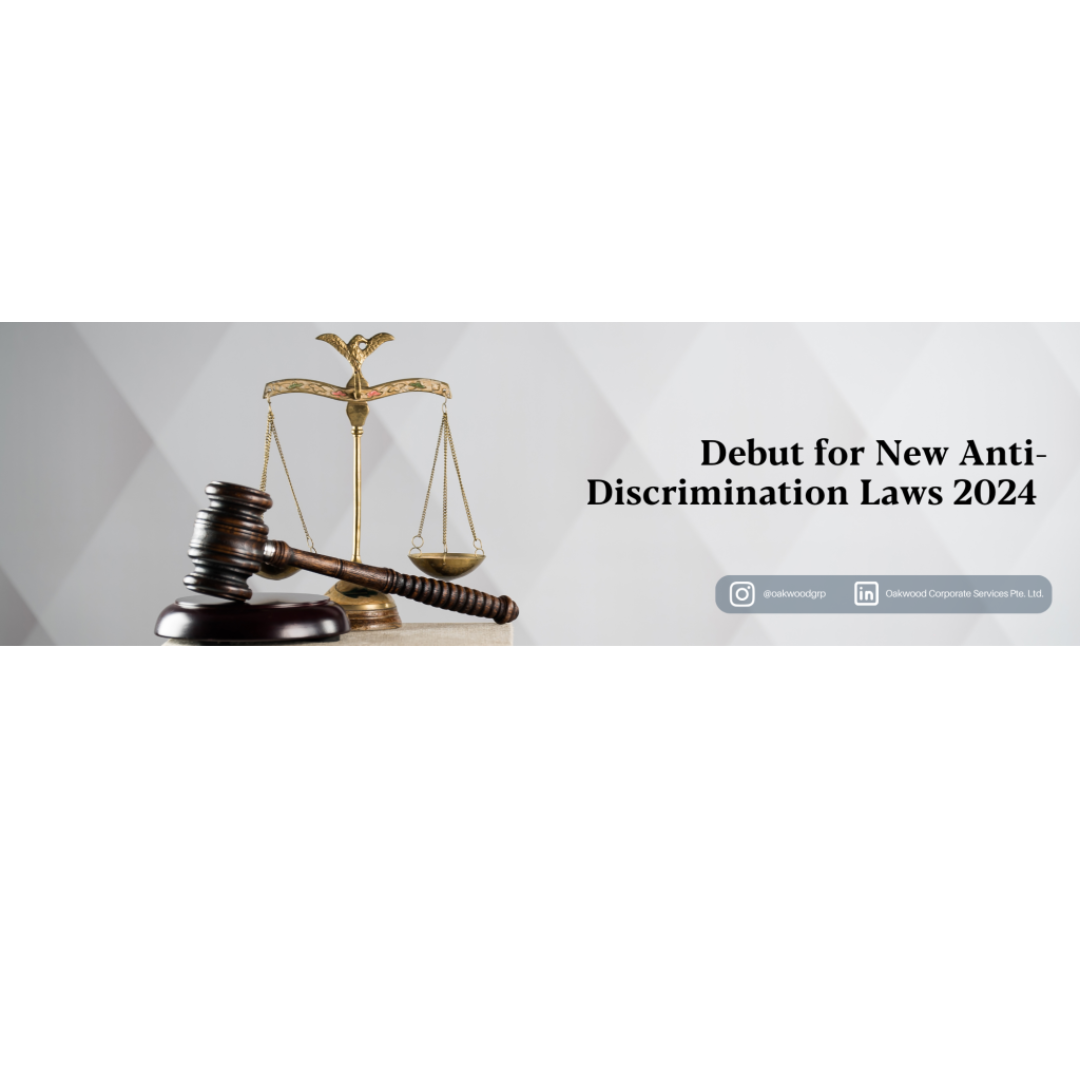
Debut for New Anti-Discrimination Laws 2024
The 2024 anti-discrimination legislation in Singapore marks a significant evolution in the nation’s socio-economic landscape, by emphasising workplace inclusivity and equity. Derived from 22 recommendations of the Tripartite Committee on Workplace Fairness, it represents a strategic response to contemporary societal norms and underscores the crucial role of diversity in economic health. This legislation aligns Singapore’s labor practices with international standards while also addressing specific local workforce needs. In this article, we will outline the key aspects and implications of this framework.

Focus Areas of the Legislation:
The forthcoming law focuses on key elements such as age, nationality, gender, marital and pregnancy status, caregiving duties, race, religion, language, disability, and mental health, tailoring its specificity to address distinct challenges and requirements within Singapore’s workforce.
While this issue has generally well-received, the legislation has sparked debates within the LGBTQI+ community, given the exclusion of SOGIESC (Sexual Orientation, Gender Identity and Expression, and Sex Characteristics) as a protected characteristic. This omission raises questions about the law’s comprehensiveness in anti-discrimination coverage.
Mechanisms for Reporting and Protection:
The framework underscores the importance of a safe reporting environment where individuals can raise concerns about discrimination without fear of retaliation. This promotes a transparent working environment.
Promotion of Equal Career Chances:
A fundamental aspect of this legislation is the promotion of equal opportunities in career advancement, which resonates with Singapore’s commitment to fairness and meritocracy in the workplace.
The Role of the Tripartite Committee:
The Tripartite Committee committee, which includes the Ministry of Manpower, the National Trades Union Congress (NTUC), and the Singapore National Employers Federation (SNEF), is instrumental in formulating these recommendations, which showcases a cooperative effort among government, labour unions, and employers.
Advisory on Accommodations:
The legislation constitutes of an advisory segment which is aimed at educating employers about reasonable accommodation for employees with disabilities, therefore underscoring a commitment to an inclusive workforce.
Scope and Exemptions:
The proposed exclusions for genuine business needs, religious organisations, and small businesses with less than 25 employees, attempt to strike a balance between the principles of anti-discrimination and the realities of business and cultural practices.
Preference for Pre-Litigation Mediation:
NTUC advocates for mediation through the Tripartite Alliance for Dispute Management before resorting to legal action, therefore this favours amicable resolution over court disputes.
Enforcement and Implementation:
The legislation specifies detailed enforcement strategies to guarantee compliance and effectively tackle any instances of employer misconduct.
Consequences for Employers and Employees:
Both employers and employees will face changes, with businesses requiring to revise policies and practices, and employees gaining more channels to raise issues regarding discrimination and consequently seeking justice.
Evolving Workplace Standards:
This legislation reflects Singapore’s evolving workplace norms, which heavily emphasizes diversity and inclusion.
The new legislation will notably impact employers and employees alike. Small businesses may struggle to adapt to the regulations with fewer resources, unlike larger corporations that may need broader changes. Its significant effect on company policies, workplace culture, and employee interactions will demand adjustments across businesses of various sizes.
Overall, the introduction of this legislation indicates a significant change regarding how Singaporean businesses operate and how employee rights are protected. It aligns with a global trend towards stricter anti-discrimination practices in the workplace, which adapts to modern labour market challenges and societal expectations.
Case Study Overview:
The UK’s Worker Protection (Amendment of Equality Act 2010) Act 2023, which is effective from October 2024, revises the existing Equality Act to intensify the prevention of workplace sexual harassment. It places a duty on employers to prevent harassment and holds them accountable for harassment by third parties in some cases, with possible compensation increases for tribunal claims.
Singapore and the UK:
Singapore’s forthcoming anti-discrimination legislation offers a broad framework against various forms of workplace discrimination, while the UK’s amendment specifically targets sexual harassment, which emphasises prevention over just redress. This contrast highlights different international strategies for addressing workplace fairness: Singapore’s wide-ranging approach versus the UK’s focused amendment on sexual harassment.
In practice, these laws necessitate operational changes for businesses, with UK companies needing to actively prevent sexual harassment and Singaporean businesses preparing for compliance with a broader set of anti-discrimination measures.
By incorporating perspectives from legal experts, HR professionals, and Tripartite Committee representatives would provide a multifaceted understanding of the legislation’s implications.
In summary, Singapore’s 2024 anti-discrimination law signals a substantial shift in workplace norms, which aligns with broader societal changes and a dedication to safeguarding employee rights. The law’s comprehensive scope, encompassing various workforce aspects, highlights its potential impact. However, concerns, particularly regarding LGBTQI+ protections, indicate potential areas for future refinement.

